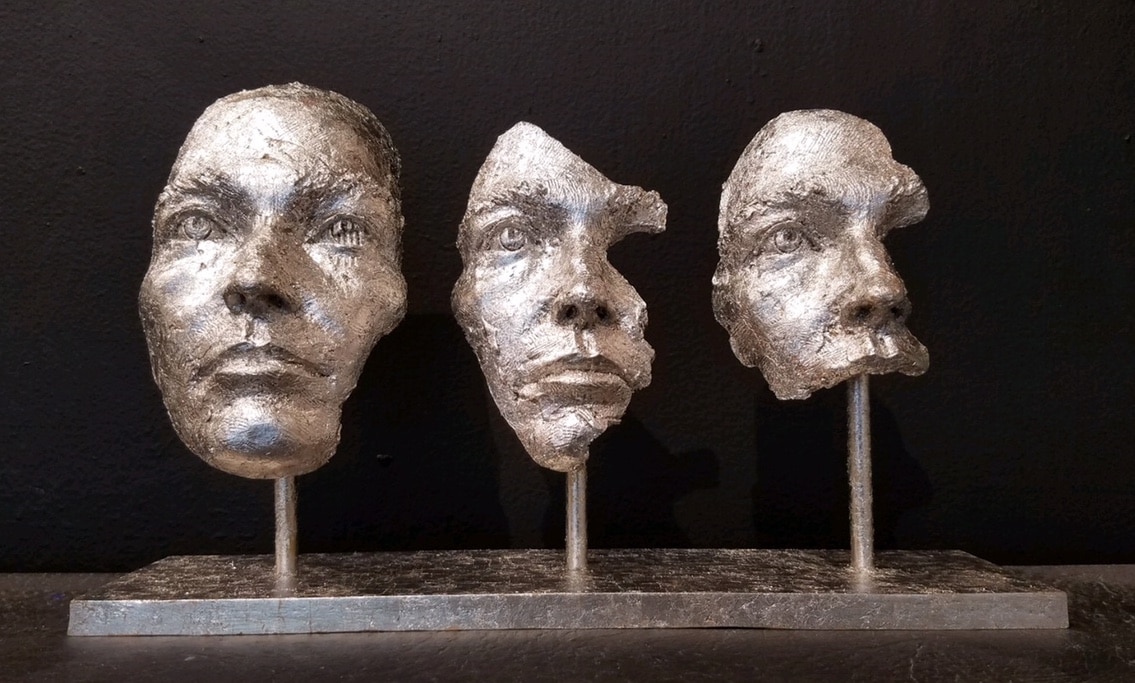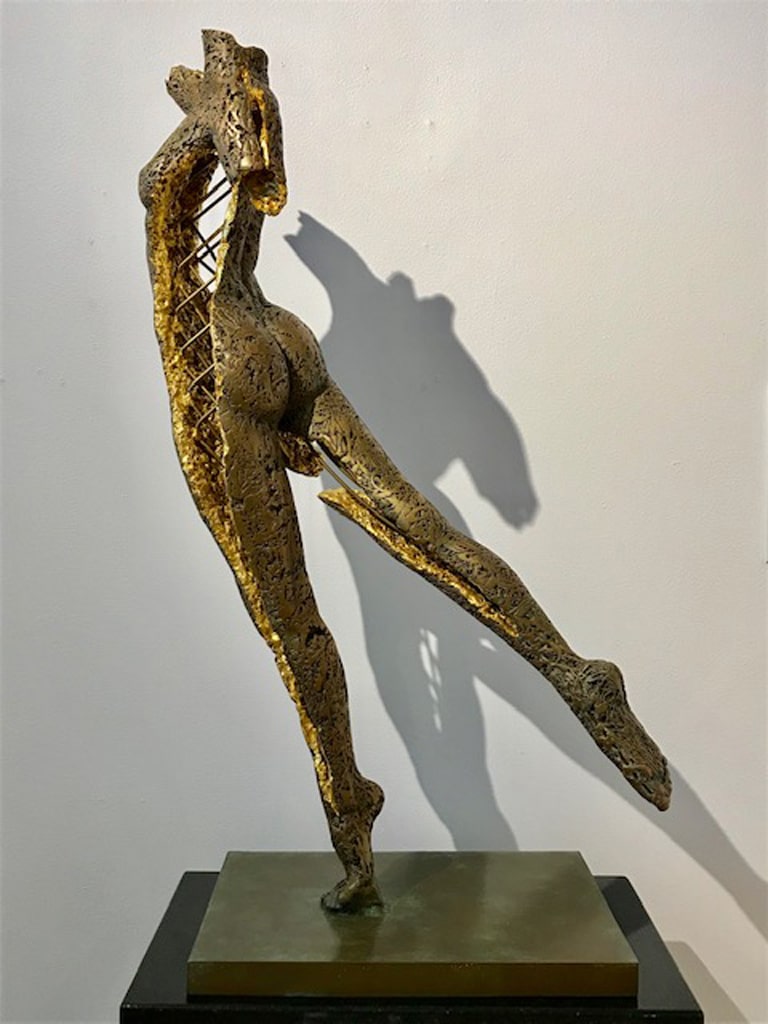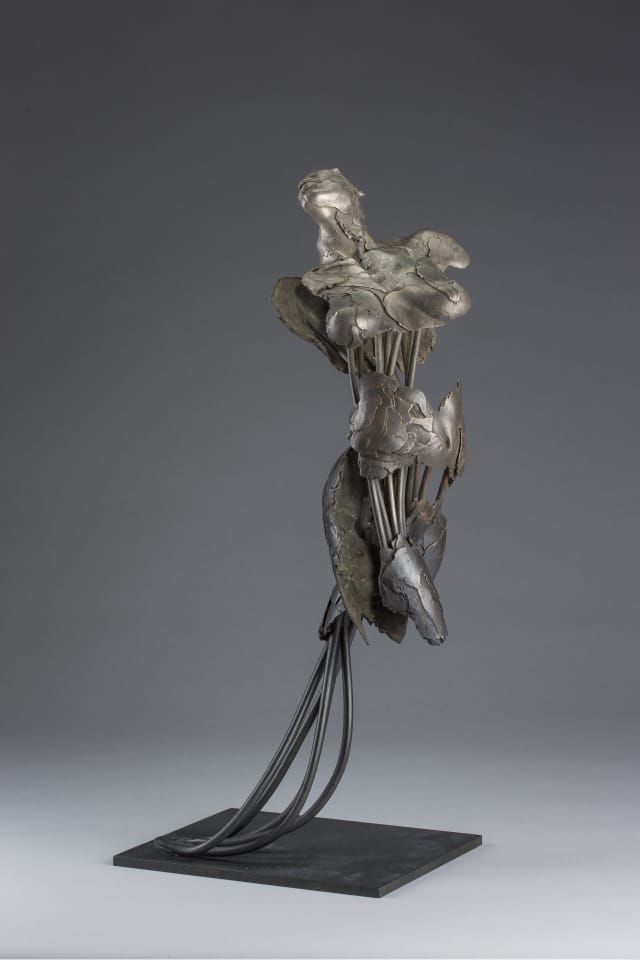The true extent of the collaboration between Boky Hackel-Ward and Blake Ward was a secret for years.
The story of husband-and-wife artists Blake Ward and Boky Hackel-Ward is a romance, certainly, but one complicated by the tribulations of the art market, among other obstacles.
They were born on different sides of the world: Ward in the depths of the Northwest Territories in Canada into a family that made its name running an airline and Hackel in Germany, who then was raised between Switzerland, Costa Rica, and Venezuela.
In a cinematic turn, the pair met at a wedding where he was the best man and she the maid of honor. There was a spark—but Hackel was married at the time and both were busy pursuing individual artistic careers.
Ward had studied figurative sculpture in Paris with the sculptor Cyril Heck and gone on to teach sculpture at the University of Hanoi, as one of the first Western educators in Vietnam since 1945. She was a Conceptual artist and polyglot who played in an orchestra and restored artworks for a living.

Three years later, the two would meet again, and, with Hackel newly single, they soon became a couple. But their union was more than romantic.
An artistic collaboration soon grew between them as Hackel slowly informed the development of Ward’s sculptures. Mutually thrilled by this development, the pair was unaware that their collaboration would actually cause a flurry of distress as Ward’s publicist at the time quickly tried to subdue news of Hackel’s involvement, believing it would damage his client’s career. For years, as later gallerists would continue to subtly dismiss her influence, Hackel continued to work quietly behind-the-scenes.
Now, for the first time, the couple will present both their own works and their collaborative efforts together in “Somewhere Within” at Chicago’s Hilton Asmus Contemporary. Recently, we caught up with the pair to learn more about their story and this collaborative debut.

How did you two begin to collaborate? Was it something you discussed or did it just happen?
Boky Hackel-Ward: Our collaboration happened quite naturally. I had been working in art restoration and at one point Blake asked me to help with some gold leafing on one of his sculptures. Before we knew it, I was learning about his process and helping him with wax casting, which can be rather temperamental with regards to temperature. We would enter this state of flow, where the world of the studio became the only world.
We went on foundry visits together, too. The first time I went, I just watched, but with my career history, working the bronze came quite naturally to me. Power tools and files didn’t intimidate me. Blake asked me for help, so I put some gloves on and the rest is history.
What was your work like before you started collaborating with Blake?
Boky: I composed music and wrote poetry and whenever possible did performance art pieces, such as conducting the university orchestra, complete with vocal cadenzas. I was strongly influenced by artists such as Laurie Anderson, John Cage, David Tudor, Merce Cunningham, and Robert Wilson.
One of my early sculpture pieces is Requiem for my Father, which is made of crushed wire and computer memory boards. I built things but it was a bit like swimming in the dark. I never really found the right medium until Blake walked into my life.
Blake, what qualities did you feel Boky contributed to your work?
Blake: When we were working in the foundry, she wasn’t concerned with the technical principles of the pour; she was fearless. I liked that energy. I watched her pour and copied her abandonment and found myself using the technique or, shall we say, the freedom with which she poured the wax.
She introduced the idea of deconstruction or, what we now call, the reverse engineering of our sculptures. She’s very good at editing the wax sculptures. I realized that these pieces were no longer just mine, they had changed and I wanted to include her in that.

When did you decide to start signing works together, to define yourselves as equal partners?
Blake: Boky made a sculpture called Hathor while I was away on a trip. When I saw it I recognized its significance: it’s a beautiful work that I couldn’t improve upon. Then, right away, I insisted she sign it. In my opinion, with that work, Boky had expanded upon the rules of classical sculpture and she had helped me to break some of those rules as well.
So her name is written on it in bronze. I thought that everyone would recognize and accept that she was a co-creator, but people didn’t. It seemed that everyone preferred to ignore the fact. I pushed back, since truly these people, particularly one marketing consultant, had no idea what she had contributed and were wrongly worried about my career.

That must have been difficult for your relationship both as a couple and as collaborating artists.
Blake: These people missed the point completely. One of the things we try to do with this body of work is tell the truth; the truth in materials, the truth about the work, about how the work is made. This was another part of telling the truth. I was embarrassed by the way Boky was treated.
Boky: People insisted I’d ruin your career and I didn’t want to cause trouble for you. In this era, I suppose I expected some visibility as an individual artist. If nothing more, some credit for my work, for my ideas, and for my writing.
What changed?
Blake: We stepped back and removed these people from our lives. First I was shocked, then I was mad and then we became resilient. We retreated and let everybody’s contracts expire. It was a new chapter in both our careers.
Boky: Another very important element has been having a gallerist such as Arica Hilton who recognized us as a creative entity and wanted to show that to the world. She is an artist herself and an ardent defender of women.

How does it feel to be exhibiting together as an artistic entity for the first time?
Boky: The idea of being able to share our love story and our sculpture with others, and to do so openly, means everything to me. It means I’m not invisible. We all have our own stories and we all have the possibility of healing. For me this exhibition is about letting the light shine and telling the truth.
Blake: It is also about celebrating the overlooked accomplishments of Boky and all women, as well as recognizing realities facing our society today. Women still have to fight so hard for every little thing.
Written By | Artnet
